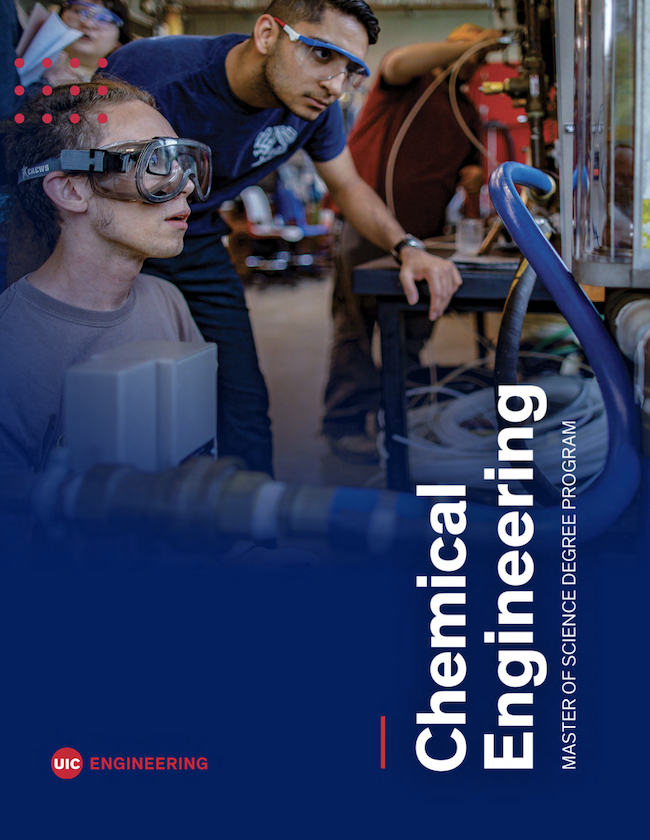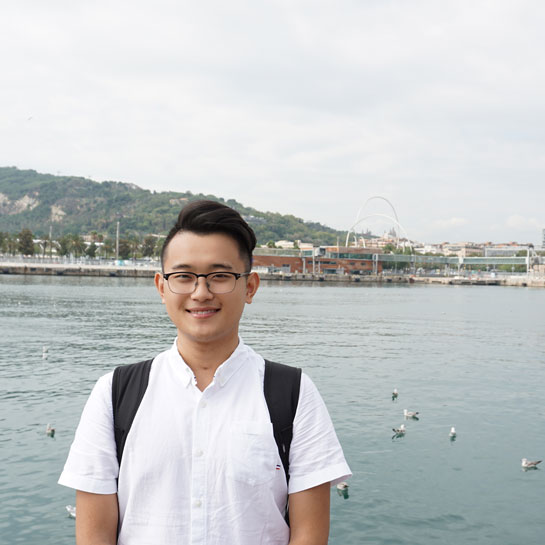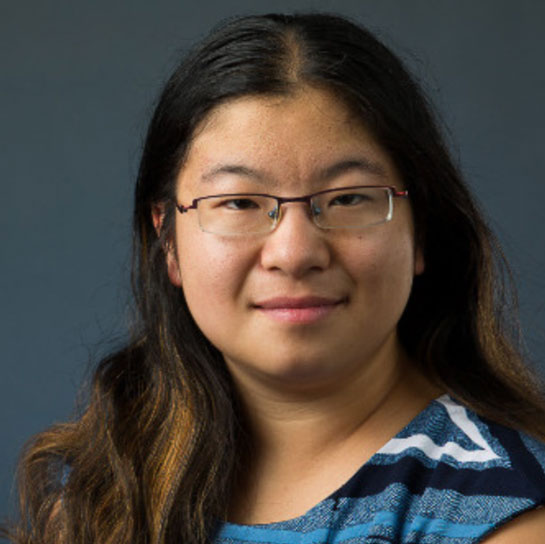MS Program
intro

The MS in Chemical Engineering at UIC is designed to provide all students with advanced knowledge of chemical engineering while allowing them to make certain choices that customize the program for their specific needs.
There are three formats: a two-year program, a one-year fast-track program, and a 4+1 program that allows current chemical engineering undergraduates to apply to finish both their BS and MS in five years total.
No matter which format you choose, you will learn about core subjects in chemical engineering such as continuum and molecular fluid mechanics, heat and mass transfer, macroscopic and microscopic thermodynamics, chemical kinetics, and process analysis. The knowledge and skills acquired in our MS program can be applied to energy production and utilization, material properties under extreme conditions, biologically based processes, and the environment, among other fields.
Find out more about specific requirements below, and download our MS degree overview booklet (PDF) to get acquainted with our program.
Three ways to earn your MS in Chemical Engineering
-
Two-Year Format
The two-year format offers several advantages, including more time at UIC to complete your degree and the chance to pursue an original thesis, if you would like to. This format has a project option and a coursework-only option as well.
-
One-Year Format
The one-year “fast track” format does not offer a thesis option, but it does allow you to finish your master’s degree on an accelerated timetable. Students spend either three semesters (fall, spring, and summer) or two semesters (fall and spring) at UIC.
-
4+1 Format
The 4+1 format is a special option available only to current undergraduate chemical engineering majors at UIC. Students take two graduate-level classes in their undergraduate senior year so that they can finish the MS in their fifth year.
Two-Year Format
Students who choose to complete the MS in Chemical Engineering in two years—the most traditional format—can select from three options: thesis, project, or coursework-only. Expand the sections below to learn about the curriculum for each option.
Two-Year With Thesis
In the two-year format with the thesis option, students complete a suite of coursework in preparation for a master’s-level research project, which they execute with the support of a faculty advisor. The thesis option is strongly recommended for students who may consider going on for a PhD after finishing the MS program.
Required semester hours: 36
Required courses: 5 courses (20 semester hours)
- CHE 501 Advanced Thermodynamics or CHE 502 Fluid Phase Equilibria
- CHE 510 Separation Processes or CHE 511 Advanced Mass Transfer or CHE 512 Microhydrodynamics, Diffusion, and Membrane Transport
- CHE 520 Transport Phenomena
- CHE 527 Advanced Chemical Reaction Engineering
- CHE 531 Numerical Methods in Chemical Engineering or CHE 545 Mathematical Methods in Chemical Engineering
Electives: 1 course (4 semester hours)
Research: 3 courses of CHE 598 MS Thesis Research (12 semester hours)
Two-Year With Project
The two-year format with the project option allows students to demonstrate their learning in the form of a substantive capstone project that is advised by a faculty member and evaluated by the advisor and one other faculty member. The project work and a required summary report must demonstrate a high level of professional skill, but students do not need to formally present or defend their projects.
Required semester hours: 36
Required courses: 5 courses (20 semester hours)
- CHE 501 Advanced Thermodynamics or CHE 502 Fluid Phase Equilibria
- CHE 510 Separation Processes or CHE 511 Advanced Mass Transfer or CHE 512 Microhydrodynamics, Diffusion, and Membrane Transport
- CHE 520 Transport Phenomena
- CHE 527 Advanced Chemical Reaction Engineering
- CHE 531 Numerical Methods in Chemical Engineering or CHE 545 Mathematical Methods in Chemical Engineering
Electives: 3 courses (12 semester hours)
Research: 1 course of CHE 597 MS Project Research (4 semester hours)
Two-Year Coursework Only
In the two-year format’s coursework-only option, students complete all the requirements for the degree through coursework. There is no thesis or project.
Required semester hours: 36
Required courses: 5 courses (20 semester hours)
- CHE 501 Advanced Thermodynamics or CHE 502 Fluid Phase Equilibria
- CHE 510 Separation Processes or CHE 511 Advanced Mass Transfer or CHE 512 Microhydrodynamics, Diffusion, and Membrane Transport
- CHE 520 Transport Phenomena
- CHE 527 Advanced Chemical Reaction Engineering
- CHE 531 Numerical Methods in Chemical Engineering or CHE 545 Mathematical Methods in Chemical Engineering
Electives: 4 courses (16 semester hours)
One-Year Format
Students in the one-year format who pursue the project option spend a fall, spring, and summer semester at UIC, meaning that they begin classes in August and graduate the following August. One-year students who choose the coursework-only option complete their degrees in one fall and one spring semester, starting classes in August and graduating in May. Expand the sections below to learn about the curriculum for each option.
fast track project
Required semester hours: 36
Fall semester: 13 semester hours
- CHE 520 Transport Phenomena
- CHE 501 Advanced Thermodynamics or CHE 502 Fluid Phase Equilibria
- One elective: 400-level or 500-level CHE course or equivalent
- CHE 595 Seminar in Chemical Engineering Research (1 credit hour)
Spring semester: 17 semester hours
- CHE 527 Advanced Chemical Reaction Engineering
- CHE 510 Separation Processes or CHE 511 Advanced Mass Transfer or CHE 512 Microhydrodynamics, Diffusion, and Membrane Transport
- CHE 531 Numerical Methods in Chemical Engineering or CHE 545 Mathematical Methods in Chemical Engineering
- One elective: 400-level or 500-level CHE course or equivalent
- CHE 595 Seminar in Chemical Engineering Research (1 credit hour)
Summer semester: 6 semester hours
- CHE 594 Advanced Topics in Chemical Engineering (2 credit hours)
- CHE 597 MS Project Research
one-year coursework
Required semester hours: 36
Fall semester: 16 semester hours
- CHE 520 Transport Phenomena
- CHE 501 Advanced Thermodynamics or CHE 502 Fluid Phase Equilibria
- Two electives: 400-level or 500-level CHE course or equivalent
Spring semester: 20 semester hours
- CHE 527 Advanced Chemical Reaction Engineering
- CHE 510 Separation Processes or CHE 511 Advanced Mass Transfer or CHE 512 Microhydrodynamics, Diffusion. and Membrane Transport
- CHE 531 Numerical Methods in Chemical Engineering or CHE 545 Mathematical Methods in Chemical Engineering
- Two electives: 400-level or 500-level CHE courses or equivalent
4+1 Format
UIC chemical engineering undergraduates may apply to earn both a bachelor’s and master’s degree in just five years. In the 4+1 format, participants earn a bachelor’s degree in their first four years and then complete the master’s degree in chemical engineering in the fifth year. During the fifth year, participants will be enrolled as master’s students in the graduate college and will be responsible for all associated fees and tuition that come with being a graduate student.
In this format, students receive approval from their academic advisor to take their first two graduate courses in their senior year, and these courses also meet their undergraduate requirements for technical electives or electives outside the major. The 4+1 format is ideal for undergraduates who have excelled academically and who want to pursue graduate-level study in chemical engineering or enter the industry at a higher level.
Undergraduates may apply to this program at any time, but no later than the end of the second week of their senior fall semester. A GPA of 2.5 or higher in the prior semester is required. For more information or to begin an application, fill out the 4+1 program expression of interest form.
For more information about the 4+1 option, watch this video in which Vikas Berry, department head, and Alan Zdunek, director of undergraduate studies, break down how it works.
MS Alumni in Their Own Words

Sihang Chen ’19
MS in Chemical Engineering
via the China 3+2 Program
Why drew you to the master’s program at UIC? I chose this degree from UIC because the ChE department has a high ranking in the United States, and I like transport phenomena. I met many patient professors with excellent teaching skills and learned interesting, cutting-edge knowledge. The department also has cool research areas that I was interested in.
What’s up next in your career? A PhD. I want to go deeper into the energy field with simulation tools and apply my knowledge to industry.
How did the ChE department at UIC help prepare you for this next step? It provides many practical opportunities for graduate and undergraduate students in the lab. If someone is interested in one specific research area, they could contact the related professor, and in most cases, they would be allowed to go into the professor’s lab and join the weekly group meeting. This point is really significant for someone who aims to get experimental skills, and it was beneficial to my PhD applications.
Did you have a favorite class or group you were a part of while at UIC? ChE 520 Transport Phenomena with Professor Wedgewood. It reveals the nature of the distribution of momentum, energy, and mass by means of mathematical tools. Professor Wedgewood was the student of famous scientist Professor Bird, who is the “father of transport phenomena” in chemical engineering. I feel honored that I can be taught by him.
Would you recommend the College of Engineering to new applicants? If so, why? Of course I would, because it is beneficial to their career no matter what they want. If they want to find positions in industry, UIC provides many connections to the job market.
Shirley

Shirley Xiao ’16
MS in Chemical Engineering
Research Engineer
UIC Energy Resources Center
What are some of your day-to-day tasks? I perform energy audits of income-eligible apartments and public housing as well as commercial and industrial facilities. I also work on combined heat and power feasibility assessments and help out with ComEd’s K-12 program.
What’s great about your job? The people that I work with are great. Because we come from many different backgrounds, not just engineering, I get to hear about the various aspects of energy efficiency in Illinois.
How do you hope your work will create positive change in the world? I hope my work helps the Chicagoland area to reduce its electricity and gas usage. I also hope to help educate people on the importance of saving energy and the different ways to do it.
Favorite thing about the chemical engineering department? The small department gave me ample time to get to know my classmates and teachers.
One-sentence “Words of wisdom” to share with students: Classes are important, but making connections and helping one another through difficulties are more important. Also, if you have an interest in something, you have to pursue it.
Program Requirements
All MS students must meet all Graduate College minimum requirements in addition to the requirements of their specific program.
Our MS programs require a grade point average of at least 3.0 (with A = 4.0). Credit toward a graduate degree is not given for any course in which a grade of less than C has been obtained. No graduation credit is given for credit/no credit courses. All courses must be approved first by the student’s advisor and then by the director of graduate studies.
There is no comprehensive examination in our MS program.
The UIC Graduate College requires that a student complete our MS programs within five years of the date of initial registration.